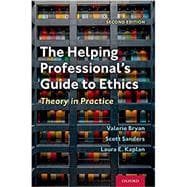
The Helping Professional's Guide to Ethics Theory in Practice
by Bryan, Valerie; Sanders, Scott; Kaplan, Laura E.-

Receive Free Shipping To The More Store!*
*Marketplace items do not qualify for the free shipping promotion.
-
 We Buy This Book Back!
We Buy This Book Back!
-
 eCampus.com Device Compatibility Matrix
eCampus.com Device Compatibility Matrix
Click the device icon to install or view instructions
Buy New
Rent Textbook
Rent Digital
Used Textbook
We're Sorry
Sold Out
How Marketplace Works:
- This item is offered by an independent seller and not shipped from our warehouse
- Item details like edition and cover design may differ from our description; see seller's comments before ordering.
- Sellers much confirm and ship within two business days; otherwise, the order will be cancelled and refunded.
- Marketplace purchases cannot be returned to eCampus.com. Contact the seller directly for inquiries; if no response within two days, contact customer service.
- Additional shipping costs apply to Marketplace purchases. Review shipping costs at checkout.
Summary
validates their moral intuition and challenges moral assumptions. Part I of the text introduces basic moral theory, provides an overview to moral development, and introduces the common morality framework. Part II focuses on common ethical issues faced by helping professionals such as:
confidentiality, competency, paternalism, informed consent, and dual relationships. Each chapter provides an overview of each concept and their ethical relevance for practice. Throughout the text, students put their critical thinking skills into practice to promote deep learning. Real-life cases
bridge the gap between theory and practice, and discussion questions reinforce the concepts introduced in each chapter.
Author Biography
Valerie Bryan (MSW, PhD, University of Kentucky) is associate professor and former program baccalaureate program director at the University of South Alabama. While teaching across the generalist social work curriculum, her scholarly areas of interest include applied ethics, juvenile justice, gender
studies, child welfare, and health disparities.
Scott Sanders (MSW, Grand Valley State University; PhD, University of Kentucky) is program director and professor of social work at Lourdes University. He advocates for a practical application of ethical decision-making to school social workers, substance abuse counselors, child and family service
workers, and social work educators.
Laura E. Kaplan, (PhD, MSW, LCSW, University of Kentucky) teaches with Fordham University's Graduate School of Social Services online MSW program. She provides professional CEU courses and consults in the United States and abroad. She also reviews federal grant applications and has published
professional articles, textbooks, instructor manuals, and curricula. Her extensive background in community activism and professional practice has laid the groundwork for her interest in ethics and human rights and social justice in social work practice and education.
Table of Contents
Preface
1. The Basics of Moral Theory, Professional Codes of Ethics, and Professional Ideals
Contemporary Professional Principles and Ethical Principlism
Deontology, Utilitarianism, and Principlism
Codes of Ethics and Principlism
Practice Concerns and Ethics Education
The Disconnect Between Values and Ethical Decision-Making
Conclusion and Future Directions
2. Moral Development and Ethical Decision-Making in Social Work Practice
Kohlberg's Theory of Moral Development
The Neo-Kohlbergian Approach
The Four-Component Model
Conclusion
3. Common Morality and Ethical Decision-Making
Bernard Gert
Common Morality
Conclusion
4. Confidentiality and the Duty to Warn and Protect
The Concept of Confidentiality in the Helping Professions
Codes of Ethics and Laws About Confidentiality
The Duties to Warn and Protect
Common Morality, Confidentiality, and the Duty to Warn/Protect
Analysis of Confidentiality and Private Health Information Through the Common Morality Framework
Conclusion
5. Competency
Competency and the Court System
Competency Defined
Competency as the Ability to Make a Rational Decision
Conclusion
6. Paternalism
Conceptualization of Paternalism
Common Morality and Paternalism
Analysis of Paternalism in an Involuntary Psychiatric Hospitalization Through the Common Morality Lens
Conclusion
7. Informed Consent: Important Moral Considerations
Background
The Product of Informed Consent
The Moral Basis of Informed Consent
Valid Consent: A Professional Duty
Competence, Rationality, and Informed Consent
Coercive Environments and Informed Consent
Drug Treatment Courts
Analysis of Informed Consent to Enter Drug Treatment Court Through the Common Morality Lens
The Relationship Between Informed Consent and Paternalism
Ideal Consent
Conclusion
8. Dual Relationships
Definitions of Dual Relationships
Substance Abuse and Dual Relationships
Analysis of Dual Relationships Through the Common Morality Lens
9. Moral Disagreement and Common Morality
Assessing Bob's Competence
Analysis of Treatment Refusal Through the Common Morality Lens
Analysis of Floyd's Treatment Through the Common Morality Lens
10. Concluding Comments
Coming Full Circle
Application of the Common Morality Framework in Individual Cases
Values, Principles, Standards, Laws, and the Common Morality
Conclusion
References
Index
An electronic version of this book is available through VitalSource.
This book is viewable on PC, Mac, iPhone, iPad, iPod Touch, and most smartphones.
By purchasing, you will be able to view this book online, as well as download it, for the chosen number of days.
Digital License
You are licensing a digital product for a set duration. Durations are set forth in the product description, with "Lifetime" typically meaning five (5) years of online access and permanent download to a supported device. All licenses are non-transferable.
More details can be found here.
A downloadable version of this book is available through the eCampus Reader or compatible Adobe readers.
Applications are available on iOS, Android, PC, Mac, and Windows Mobile platforms.
Please view the compatibility matrix prior to purchase.

